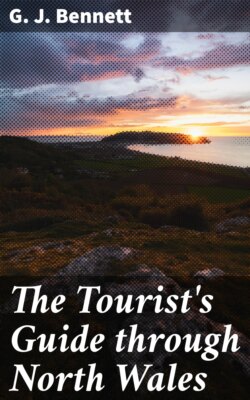Читать книгу The Tourist's Guide through North Wales - G. J. Bennett - Страница 11
На сайте Литреса книга снята с продажи.
SHREWSBURY.
ОглавлениеTable of Contents
The old town of Shrewsbury contains many objects of considerable interest and historical association, which will afford to the antiquary or the curious abundant gratification for the few hours he may devote to them. Those to which the traveller should in particular direct his attention are the Castle, the Abbey, and St. Giles’s Church; the two former were built by the first Norman Earl of Shrewsbury, Roger de Montgomery.
The town is beautifully situated on the Severn, on a peninsula made by the bend of the river; and, standing upon gentle eminences, it presents a bold and commanding appearance. Upon the west side of the town, stretching along upon the banks of the river, and over-arched with magnificent lime trees, is a most delightful promenade—called the Quarry.
Having stayed the night in Shrewsbury, the following morning I once more placed myself in a railway carriage for a short ride upon the line to Chirk, at which place I had made up my mind to commence my pedestrian tour. I think it necessary, however, to impress upon the minds of tourists that the Llangollen Road Station (which is a mile beyond Chirk) is unquestionably the key upon this side of the country to the very heart of the finest scenery in Wales, and that from thence he can obtain public conveyances which run daily to Capel Curig, Snowdon, Bala, Barmouth, Dolgelley, and a hundred other enchanting places in the Principality.
Arriving at Chirk Station, I, like the Honourable Dick Dowlas, with my wardrobe on my back, and a light heart, proceeded on the road to the village. Bees hummed, birds sang, and blossoms sent forth their fragrance, to delight the traveller as he gaily trudged “the footpath way.” Cheerfulness was above, beneath, and around me, and in my heart. I had not taken many paces when I was accosted by an elderly person, in a straw hat, fustian shooting coat, knee breeches, gaiters, and shoes, he had a stout cudgel in his hand, and knapsack more capacious than mine strapped over his shoulders. He appeared to be about fifty-five years of age, and being furnished like myself, it struck me that a passing traveller might naturally take us for father and son.
Fortunately, we were pursuing the same route, and a desultory dialogue commenced with the never-failing observation—
“A fine morning, Sir.”
“Very.”
“A great admirer of the charms of nature, I presume?”
“An enthusiastic one.”
“You’re for the Welsh vales, I suppose?”
“And mountains high,” I exclaimed, warming to my loquacious companion—
“In the Welsh vales ’mid mountains high,”
sang he, in a round-toned voice, with which I chimed in, and we were the best friends on a sudden.
There certainly is no society so interesting as that picked up by the tourist, who leaves with contempt the starched formalities of a great city behind him, and walks forth unencumbered by care, to enjoy the society of mankind in its varied and unsophisticated nature. Every person we meet affords us information and delight; for a kindred spirit animates almost every individual whom you may chance to encounter in countries remarkable for beauties of scenery, and especially in a region like North Wales, where inns of the best kind are situated at the most convenient points, and the foot passenger is treated with as much respect as a lord in his carriage. The landlords of inns here think that a man may make the proper use of his legs without being a beggar; and that the costume of a pedestrian may cover the form of a gentleman. This philanthropic conception contributes to form that happy combination, civil hosts and merry travellers.
There is no want of society, nor any difficulty in selecting that with which you are best pleased; for every evening brings in fresh comers from various quarters to the different places of rest and refreshment. The exchange of information respecting routes, the different adventures of the day, the peculiar feelings displayed in their recital, and countenances lit up with pleasure, give a degree of animation to the evening, never to be equalled in the brilliant drawing-room, the blaze of which seems to put out the eyes of reason,—
“And men are—what they name not to themselves
And trust not to each other.”
